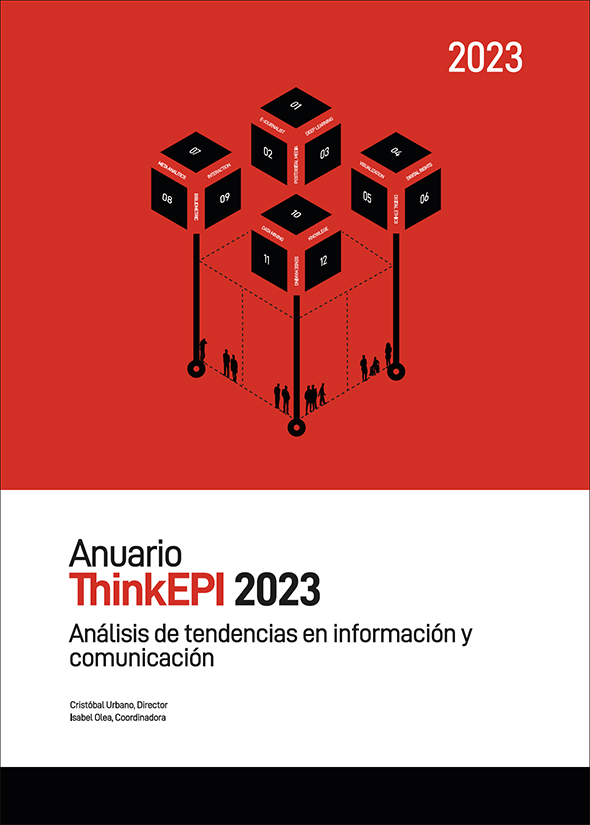Los grandes modelos de lenguaje: una oportunidad para la profesión bibliotecaria
DOI:
https://doi.org/10.3145/thinkepi.2023.e17a28Palabras clave:
Inteligencia Artificial, IA, Grandes modelos de lenguaje, Profesión bibliotecaria, Búsqueda generativa, Sesgo, í‰tica de la tecnologíaResumen
La Inteligencia Artificial (IA) generativa y los grandes modelos de lenguaje pueden cambiar la forma en que consultamos, procesamos y producimos información. Pero presentan desafíos técnicos y éticos, tales como inconsistencias, sesgos y falta de transparencia. El colectivo bibliotecario tiene aquí un papel clave, una oportunidad para apoyar el uso responsable de esta tecnología y promover la comprensión crítica de sus limitaciones. Las bibliotecas, por su parte, pueden ofrecer espacios y recursos para experimentar con la IA generativa y fomentar su uso en la investigación científica.
Descargas
Citas
Bender, Emily M.; Gebru, Timnit; McMillan-Major, Angelina; Shmitchell, Shmargaret (2021). "On the dangers of stochastic parrots: can language models be too big?". FAccT ´21: Proceedings of the 2021 ACM Conference on fairness, accountability and transparency, p. 610-623. https://doi.org/10.1145/3442188.3445922
Codina, Lluís (2023). "Buscadores alternativos a Google con IA generativa: análisis de You.com, Perplexity AI y Bing Chat". Infonomy, v. 1, e23002. https://doi.org/10.3145/infonomy.23.002
De-Vynck, Gerrit (2023). "ChatGPT "˜hallucinates´: some researchers worry it isn´t fixable". The Washington Post, May 30. https://wapo.st/3KN7dRn
Devlin, Jacob; Chang, Ming-Wei; Lee, Kenton; Toutanova, Kristina (2018). "BERT: pre-training of deep bidirectional transformers for language understanding". arXiv. https://doi.org/10.48550/arXiv.1810.04805
Griffith, Erin; Metz, Cade (2023). ""˜Let 1,000 flowers bloom´: AI funding frenzy escalates". New York Times. https://nytimes.com/2023/03/14/technology/ai-funding-boom.html
Grosse, Roger; Bae, Juhan; Anil, Cem; Elhage, Nelson; Tamkin, Alex; Tajdini, Amirhossein; Steiner, Benoit; Li, Dustin; Durmus, Esin; Perez, Ethan; Hubinger, Evan; Lukošiūtė, Kamilė; Nguyen, Karina; Joseph, Nicholas; McCandlish, Sam; Kaplan, Jared; Bowman, Samuel R. (2023). "Studying large language model generalization with influence functions". arXiv. https://doi.org/10.48550/arXiv.2308.03296
Heikkilí¤, Melissa (2023). "Why it´s impossible to build an unbiased AI language model". MIT technology review. https://technologyreview.com/2023/08/08/1077403
Lo, Leo S. (2023). "AI policies across the globe: Implications and recommendations for libraries". IFLA Journal. https://doi.org/10.1177/03400352231196172
Lopezosa, Carlos (2023a). "Bing chat: hacia una nueva forma de entender las búsquedas". Anuario ThinkEPI, v. 17, e17a04. https://doi.org/10.3145/thinkepi.2023.e17a04
Lopezosa, Carlos (2023b). "ChatGPT y comunicación científica: hacia un uso de la inteligencia artificial que sea tan útil como responsable". Hipertext.net, n. 26, pp. 17-21. https://doi.org/10.31009/hipertext.net.2023.i26.03
Mitchell, Melanie; Krakauer, David C. (2023). "The debate over understanding in AI´s large language models". PNAS, v. 120, n. 13, e2215907120. https://doi.org/10.1073/pnas.2215907120
Orduña-Malea, Enrique; Cabezas-Clavijo, Álvaro (2023). "ChatGPT and the potential growing of ghost bibliographic references". Scientometrics, n. 128, p. 5351-5355. https://doi.org/10.1007/s11192-023-04804-4
Tarnoff, Ben (2023). "Weizenbaum´s nightmares: how the inventor of the first chatbot turned against AI". The Guardian, 25 julio. https://theguardian.com/technology/2023/jul/25/joseph-weizenbaum-inventor-eliza-chatbot-turned-against-artificial-intelligence-ai
Descargas
Publicado
Cómo citar
Dimensions


